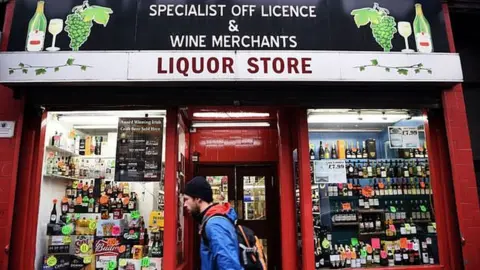Study finds alcohol sales reduced since minimum unit pricing
 Getty Images
Getty ImagesAlcohol consumption has reduced in the three years since minimum unit pricing (MUP) was introduced, a study has found.
The report by Public Health Scotland (PHS) said there had been a 3% net reduction in sales per adult in Scotland's shops.
The biggest reductions were in the sale of cider and perry, with increases in the sales of wine and fortified wine.
The Scottish government said the policy is "achieving what it set out to do."
MUP set a floor price of 50p per unit of alcohol and the legislation which introduced this requires its impact to be monitored regularly.
The new research - a Public Health Scotland collaboration with Glasgow University - suggested a net reduction of 3% in sales per adult of alcohol from supermarkets and off-licences, when compared with England and Wales, where there is no minimum unit price.
An earlier report also showed a similar fall in alcohol sales in supermarkets and off-licences in the first 12 months after the policy was introduced.
Maree Todd, Scotland's public health minister, said: "Minimum unit pricing is achieving what it set out to do - a reduction in sales overall with a focus on the cheap high-strength alcohol, which is often drunk by people drinking at harmful levels."
 Getty Images
Getty ImagesGlasgow University's Prof Jim Lewsey said: "The methods we've used in this study allow us to be confident that the reduction in per-adult alcohol sales that we've shown is as a result of the introduction of MUP, rather than some other factor.
"This was of particular importance with the Covid-19 pandemic occurring in our three-year, post-intervention study period, as we know the pandemic impacted on where people were able to purchase alcohol.
"We've been able to adjust for other factors, such as household income, sales of alcohol through pubs and clubs and of other drink types."
He added that the methodology also took into consideration any existing trends and seasonal variations which could exist independently of minimum unit pricing but which could have affected off-trade alcohol sales following its introduction.
"The methods we've used and the consistency in our results allow us to be confident that the reduction in alcohol sales is associated with the introduction of MUP in Scotland," he said.
Lucie Giles, public health intelligence principal at Public Health Scotland, said: "We found little evidence to suggest that MUP caused any changes in per-adult sales of alcohol through the on-trade, suggesting that MUP did not cause a substantial shift towards alcohol consumption in pubs.
"Our main finding was consistent across a range of different conditions as tested through our additional analyses.
"We can conclude that, across Scotland as a whole, MUP has been effective in reducing alcohol consumption in the first three years of implementation."